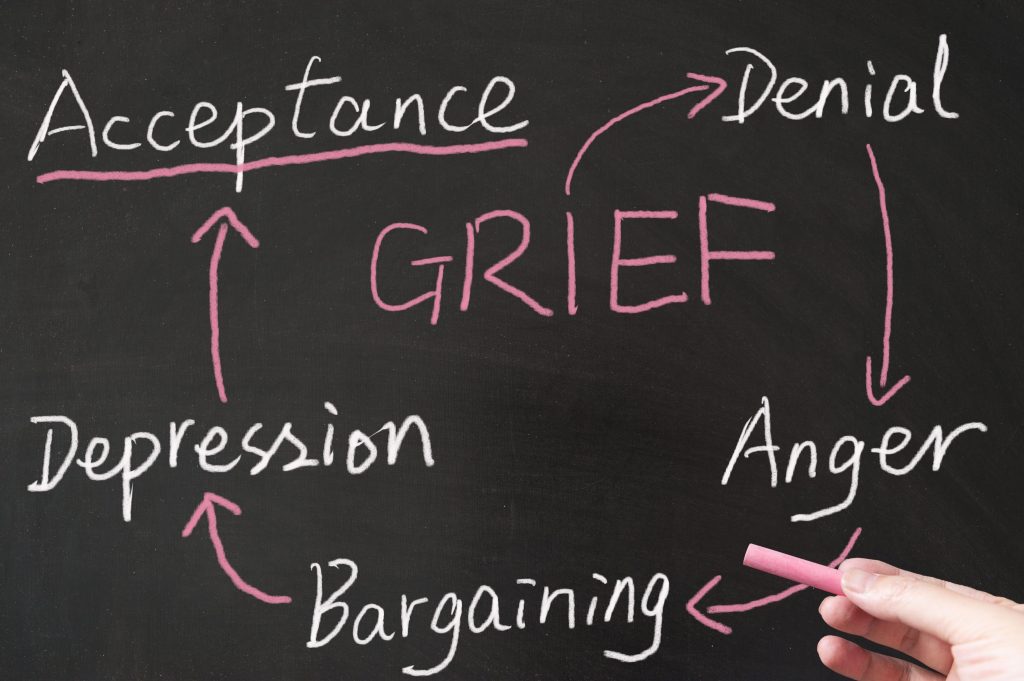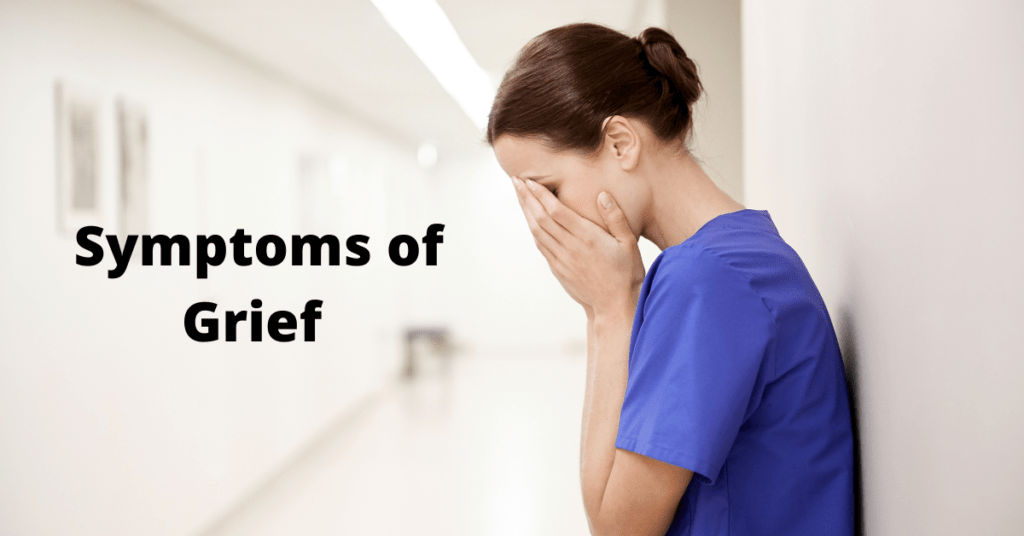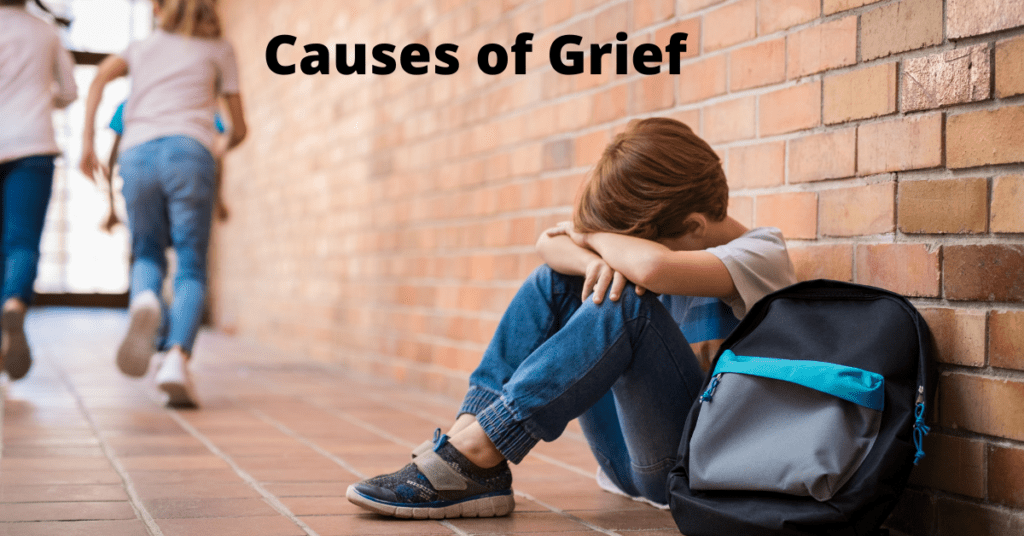What Is Grief?
Grief means different things to different people. It can be the loss of a loved one, moving homes, or even experiencing disappointment. It can be triggered by any number of events, but it is typically associated with a loss. Grief doesn’t always happen immediately after the event; sometimes people wait weeks or months before they feel overwhelmed by their emotions. There are many ways in which one can get rid of his grief. The leading one is grief counseling.
People may not even realize that what they’re feeling counts as grief. This is so because there are so many different ways to experience bereavement.
Stages of Grief

There are five stages of grief :
- Shock and Denial: This is the first stage, where someone may not feel anything at all or they’re numb from their emotions. It can last for hours or even months before things start feeling real again.
- Pain and Guilt: During this phase, it’s common for individuals to blame themselves for what has happened (i.e., if they hadn’t gone on vacation then their loved one wouldn’t have died). They might struggle with guilt because there was something else they could’ve done when faced with difficult circumstances. These circumstances are like an illness or accident that caused death. Anger is also typical during this period and many people lash out at others. This is because of the helplessness they feel.
- Bargaining: This is when people hope to spend some time with their loved ones again if they do X, Y, and Z. They may also contemplate whether or not it would be better for them to die too so that no more suffering occurs. People at this stage typically want everything to go back to normal. It is even though there’s nothing they can say or do that will reverse what has happened.
- Depression: At this point, individuals start feeling a sense of loss and sadness over what used to make them happy in life (i.e., seeing friends). It might seem like going through the motions rather than actually living day-to-day activities. It is since the future seems bleaker without someone close by.
- Acceptance: The final stage is when people start to accept their loss and find a way to move forward with life. It is without the same level of happiness they experienced previously. They might still think about what happened from time to time. It doesn’t affect them as much emotionally.
Symptoms of Grief

There are many different symptoms of grief. Some people may feel very emotional with their sadness. Others might just have physical complaints like stomach aches or insomnia. There is no right or wrong way to experience emotions in the aftermath of a loss. Everyone will deal with it differently based on personality and coping style.
Symptoms can include:
- Rapid mood swings
- Lack of concentration
- Physical pain, headaches, nausea, etc.
- Difficulty making decisions
Nightmares and memories that feel like they’re happening again, even if the event happened long ago. Such thoughts may also cause a person’s heart rate to increase or trigger other physical symptoms such as headaches or nausea.
Causes of Grief

In some cases, a person may not realize they’re going through grief. It is so because it is triggered by a seemingly random event. It could be the loss of a loved one or even moving homes. This is so that most people have an idea about when their symptoms started and what’s causing them.
However, there are many other reasons why someone may experience feelings that they don’t understand. Some potential causes of grief include:
- Loss of job/financial stability
- Going through divorce or separation
- Death in the family (not just parents)
- Losing health due to illness or accident
What is Grief Counseling?

Grief counseling is a form of therapy that helps people who are going through the difficult process of grieving. It can be offered as an individual or group therapy session. It involves discussing thoughts and feelings with a trained professional to help work through those emotions. Grief Counseling is most effective when used early after experiencing a significant event that causes distress. Seeking support immediately helps individuals find ways they can manage the stress associated with difficult situations.
Grief counseling has become more popular as people become increasingly open about discussing their feelings with others. This can be beneficial for those looking to find ways of coping with the loss they’ve experienced. This is for those who have moved forward in life. It is so that they don’t feel stuck anymore. It’s important to remember, however, that grief counseling is only one aspect of dealing with difficult emotions and experiences. It doesn’t take away from what occurred or erase any memories associated with the person who died/disappeared.
If you or a loved one is going through grief, it can be beneficial to seek professional help. Either as an individual or group session, counseling provides the opportunity for people to express their thoughts and feelings with someone who’s trained in helping them cope.
What Are Types of Grief Counseling?
There are different types of grief counseling. The two most common include individual and group counseling.
Individual Counseling

Individual sessions allow for more confidentiality in contradiction to group sessions. Some people find that sharing their experience with someone else helps them feel less alone in the world. As mentioned earlier, not everyone will be comfortable with talking to just anyone about what they’re going through. It’s very important that you find someone who will listen and not judge them. This is because people have a tendency to feel embarrassed when discussing their feelings. It is even though sharing those emotions is part of the process.
Group Counseling

Group sessions can provide additional support from others who have experienced something similar in their life. It makes it easier to talk about what they’re going through. This is without feeling judged or uncomfortable. Some people find that sharing their experience with someone else helps them feel less alone in the world. It is even if it’s just knowing that another person has gone through a similar loss at one point or another so you don’t always need professional help when there are other options available. These options are such as joining online communities, reading books related to this topic, etc. These all depend on your situation and how long ago the event occurred.
How Does Grief Counseling Works?
Counselors and other professionals who specialize in grief counseling often encourage people to talk about what they’re feeling during the process. Talking about their thoughts and feelings helps release some of the emotions that could continue to make them feel worse. Counseling is used as a way to help them process their loss and move on. It is as opposed to keeping all those difficult memories inside.
It’s important for people to find someone with whom they’ll feel safe talking about their deepest thoughts and feelings. This is so that they can express themselves without judgment or fear of judgment. Sometimes it’s helpful for people to allow family members to come into sessions with them. It can help someone but not everyone. They will not be comfortable doing so. This is so because counselors typically have strict confidentiality policies.
What Are Some Benefits of Grief Counseling?

These are some benefits of grief counseling:
- People will be able to release their emotions and become more comfortable with moving forward.
- They might also connect better with those around them who are still grieving as a result of feeling like they can open up about what they’re going through. It is without judgment or fear of making someone else uncomfortable. This is because everyone has been there before at some point in time.
- Counseling generates hope for the future by helping people identify positive things that could come from their loss. This is rather than just focusing on all the negatives. It’s important not to ignore certain feelings but instead choosing coping mechanisms. These are such as exercise, journaling, reading, etc. These are so that you don’t end up trapped with unresolved issues over an extended period of time.
- Counselors usually encourage dealing with grief in a healthy way. They help people to cope with their emotions.
How Do You Know Grief Counseling Is Right For You?
Grief counseling is mostly for people who have lost someone significant in their life, whether through death, divorce, relocation, etc. Sometimes parents will take their children into therapy when they notice them acting out after experiencing a big loss at school. They can also consult therapy if they are being put in an uncomfortable situation.
Counseling is beneficial for people who are struggling to cope with their emotions and/or having trouble moving forward in life. If someone hasn’t been able to work, eat properly, or sleep at night due to grief then they should consider seeking help from a professional therapist. People may also benefit if they’re regularly thinking about their loss. This is because it becomes overwhelming over time unlike the initial shock of what occurred.
Not everyone will be comfortable sharing all their feelings with just anyone. This is so since therapists typically have strict confidentiality policies. It’s important that you find someone with whom you’ll feel safe discussing your deepest thoughts and feelings. It is so that you can move on rather than continue feeling stuck.
What Are Some Common Issues That May Warrant Grief Counseling?
Some common issues that may warrant grief counseling include the death of a loved one due to illness or an accident. These include suicide for example where feelings like guilt often come into play. It is because it’s not something you see every day and people react differently when confronted with those circumstances. It can make coping more challenging than dealing with everyday struggles in life.
Another typical reason why someone would seek out professional help is if they’re struggling to perform their usual activities. This can be due to depression, anxiety, or other mental health-related issues.
Conclusion
You can consult professionals in order to get the help and support you need during difficult times. The grieving process never stops, and it’s important to be there for people in their time of need. If you or someone close to you is struggling with the grief from a recent loss, know that we’re here for you. We can help provide one-on-one counseling services at a low cost so don’t hesitate to reach out today.
For more information, please contact MantraCare. Grief is a natural and complex emotional response to loss or change. If you have any queries regarding Online Grief Counseling experienced therapists at MantraCare can help: Book a trial therapy session


